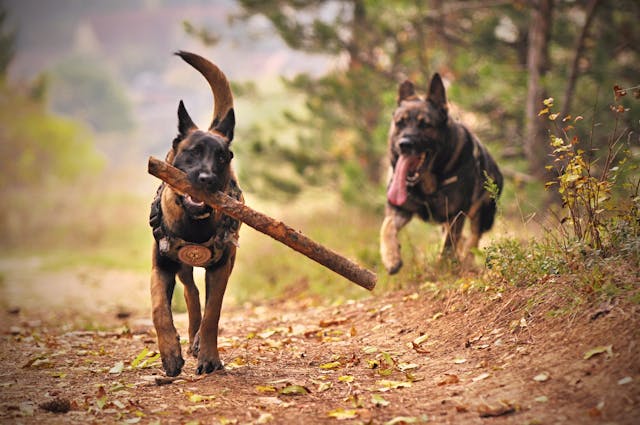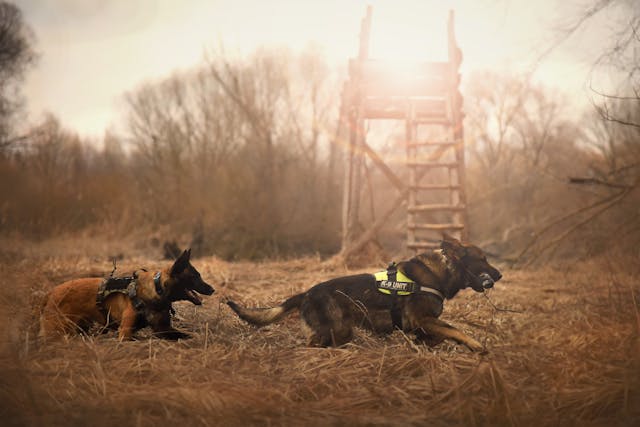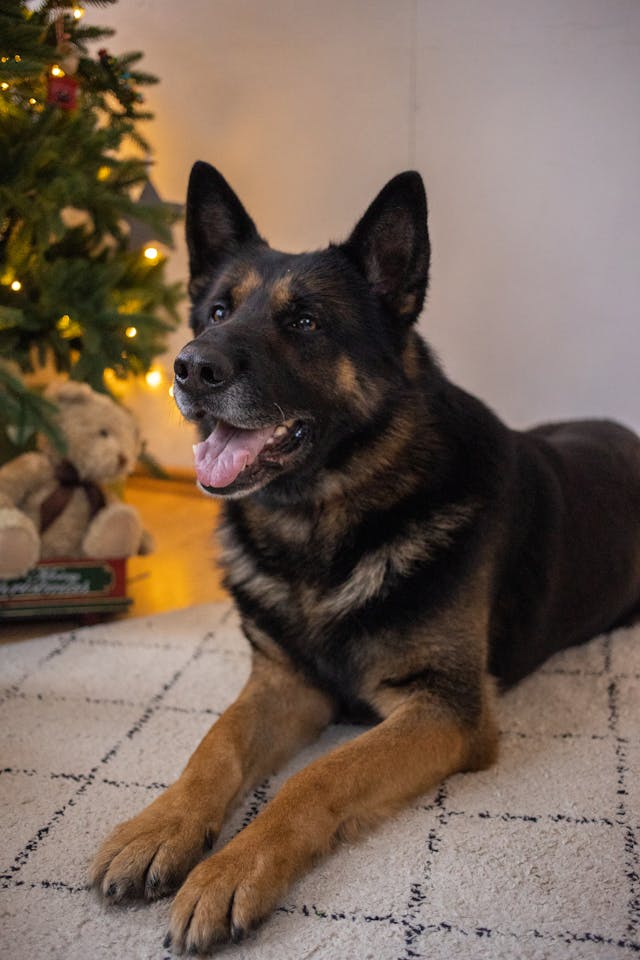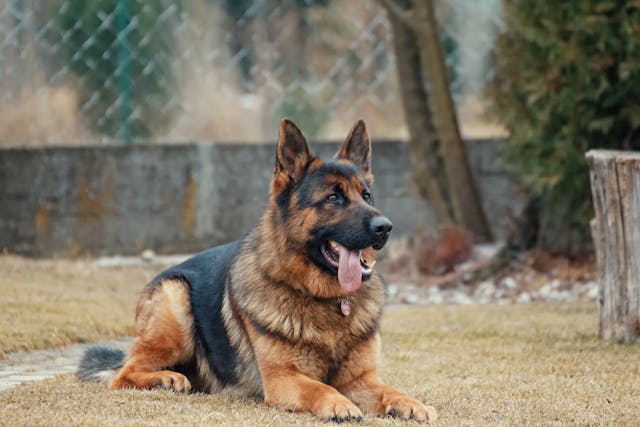When people ask if German Shepherds are good hunting dogs or Can German Shepherds Hunt?, it all depends on the type of hunting you’re considering. If you’re interested in tracking or flushing out game, German Shepherds can definitely do well in these areas. Their excellent sense of smell and ability to track make them great for locating deer scent or following a blood trail. These dogs are known for being incredibly intelligent, and with proper training, they can be trained as gun dogs or even tracking dogs. I’ve seen some really amazing examples where German Shepherds excelled at finding and flushing out game, which proves that they do have what it takes to be solid hunting partners.
However, when the focus shifts from tracking and flushing to the actual kill, the situation changes. If your goal is to hunt for meat or hide, German Shepherds may not be the best choice. While they are incredible at tracking and can help locate wounded deer, they aren’t typically bred for the final part of the hunt. Their roots go back to being herding dogs, military dogs, and guard dogs, which means their skillset doesn’t necessarily align with hunting for consumption. Despite this, it is still possible to train them for hunting, but their real strength lies in tracking and assisting with game rather than making the kill itself.
Table of Contents
Can German Shepherds Hunt?
German Shepherds may not have been bred to hunt, but they certainly possess traits that make them great working dogs. Originally bred to herd, these dogs can be trained for hunting tasks in specific categories. Their strong noses and remarkable tracking ability give them the qualities of a hunting dog, which helps them track and retrieve prey with impressive skill. Though primarily herders, these dogs are also known for their high endurance, eager nature, and work ethic, making them capable of learning and excelling at hunting tasks.

In my experience, I’ve found that German Shepherds are often able to spot objects from long distances, making them highly effective in tracking small animals like fowl, vermin, and rabbits. They also excel at locating deer trails and tracking wounded deer. Their speed and ability to run long distances make them great at covering vast areas. However, due to their power and size, they may unintentionally scare their prey. Even so, with the right training, these dogs can be a valuable asset when it comes to hunting.
The German Shepherd Dogs Huntingpedia
If you’re considering whether German Shepherds can be good hunting partners, it’s important to understand what makes them such strong contenders. Their sense of smell is outstanding, and they have excellent endurance for long runs, which is essential when it comes to tracking and recovery of game. These dogs are incredibly intelligent, which makes them easy to train. Their natural protective instinct also makes them ideal as guard dogs, but these traits make them well-suited for tracking and locating game. I’ve seen firsthand how these dogs excel in various situations, with their ability to find and track even the faintest scent over long distances.
However, there are some factors to consider. German Shepherds tend to shed heavily during springtime, and their thick coats can sometimes lead to a bad smell. Their high energy levels mean they require daily walks and enough space, so if you’re in an apartment, it might not be the best fit. Another thing to remember is that they can be quite noisy with their tendency to bark, which could be disruptive in certain living situations. Also, German Shepherds typically don’t fully mature until about two years old, so it’s important to be patient when training them for hunting. These dogs are incredibly versatile, making them both great family companions and amazing hunting dogs with the right training.
Training a German Shepherd to Hunt
Training a German Shepherd to hunt starts early with obedience training to build their confidence and prepare them for the tasks involved in hunting. Socialization helps create a strong bond, making it easier for them to follow commands. While it takes patience and time, German Shepherds are naturally obedient, making them great hunting companions. They excel in scent-tracking and can be trained to retrieve fowl, but you’ll need to teach them to not shake or damage their catch. A dog from a working line is ideal, as they have fewer behavioral and temperament issues, making training easier.
A German Shepherd‘s sense of smell is incredible, enabling them to track deer trails and follow wounded deer. Their ability to focus on a scent trail while ignoring competing scents is crucial. You’ll need to acclimate your dog to guns and the associated noise to avoid startling them. They can be trained to be flushers, retrievers, or even to find game by pointing their nose or retrieving from lakes, ponds, or undergrowth without causing harm thanks to their soft mouth. Training for tracking and shed hunting in spring and summer adds another layer of skill. Use antlers, Rack Wax, a long leash, and treats to train your dog to find antler sheds on public lands or ranch land. With consistent training and the right tools, your German Shepherd will be well-prepared for actual hunting scenarios and field trials, and you can even use a radio collar to help locate them if they get lost in thick underbrush.

Tracking Method
A great way to train your German shepherd to become a skilled hunter is by using the tracking method. You can start by observing your dog’s behavior and introducing it to an object that has been lost by someone. Let your dog grab the object and give it plenty of praises to boost its confidence and show it that it’s doing the right thing. Once your dog feels good about its abilities, you can move to a more difficult challenge. In this next step, don’t let your dog follow its natural way of finding the object. Instead, use some pieces of paper to create a track, guiding your dog to follow the trail and uncover who the person is. Over time, with patience and practice, your German shepherd will learn to master the art of tracking and become a great hunter.
The Scent Trails Method
Training your German shepherd to track using scent trails is an engaging and effective method. It helps sharpen their ability to focus on a particular scent and follow it through various conditions. By gradually increasing the difficulty of the scent trail and rewarding your dog for their success, you’ll help them become skilled hunters. Below are the key steps in using the scent trails method:
Create a scent trail with food
Start by taking your German shepherd to an open grassy area and use soft dog treats to create a scent trail. Grind the treats into the ground with your shoe so the scent is transferred and forms a clear path. Walk between the treats to establish the trail, allowing your dog to follow the scent.
Direct along trail
Once the trail is created, let your dog explore freely. Encourage them to follow the trail and praise them as they do. If your dog strays off the path or makes mistakes, simply ignore them and allow them to try again. This helps them learn the correct way to stay focused.
Pair food with deer scent
To increase the challenge, replace the food treats with deer scent on a drag or a deer hide. Begin by placing food treats along the trail to pair with the deer scent, so your dog becomes familiar with the new scent. This pairing motivates your dog to follow the scent trail more effectively.
Reward successful tracking
As your dog progresses, start removing the food treats and allow your dog to follow only the deer scent. When they successfully complete the trail, be sure to reward them with praise or a treat. This will reinforce their good behavior and tracking skills.
Add signal
Once your dog is consistently following the trail, teach them to signal you when they reach the end of the trail. Use the speak command to encourage your dog to bark at the end of the trail, and reward them when they do. Gradually stop giving the speak command, and wait for your dog to bark on their own, then reward them for the successful signal.
Object Retrieval Method
One great way to train your German Shepherd for hunting is by using the item retrieval method. This method involves asking your dog to find a particular type of item among several objects. For example, if you want your dog to search for an apple, place three apples in front of them and leave one at its original place. The goal is for your dog to bring all the items together. When your dog successfully retrieves the correct items, reward them with a treat to show appreciation for their hard work and help them understand the importance of their abilities.

This method is helpful in keeping your German Shepherd’s sense of smell active and sharp. It helps them build confidence in retrieving items, making them better hunters. By practicing this object retrieval technique, your dog will learn how to track down and bring objects without feeling any difficulty. With consistency, you’ll notice how quickly your dog becomes a more skilled and efficient hunter, learning from these tips in just a few days.
Difference Between Training and Hunting
When you train your dog, you’re teaching them basic commands like sit, stay, or come when called. This is the foundation of obedience, and you might also work on advanced skills such as navigating agility obstacles. However, when you hunt with your dog, the goal changes. Instead of just following commands, you release them into specific areas to find game. There’s an expectation that your dog will be able to run game back to you, often in a particular manner. Training helps your German Shepherd become disciplined, but hunting tests their instincts and ability to work in the field.
The Learn by Doing Method
German shepherds are highly intelligent dogs with excellent scenting abilities, making them well-suited for hunting. Using the Learn by Doing Method is an effective way to train your dog for this type of work. This method involves introducing your dog to real-world experiences and allowing them to learn through observation and practice. By focusing on small, incremental steps, you can guide your German shepherd through the various stages of becoming a skilled hunting dog. Below are the key steps in this process, ensuring a solid foundation for your dog’s hunting abilities.
Explore terrain
Before you begin serious tracking, it’s essential to help your German shepherd adjust to rough terrain and different outdoor environments. Expose them to various landscapes, allowing them to get used to navigating the wilderness and other challenging settings. Make sure they are in good condition, both physically and mentally, so they can handle the demands of hunting. This phase of conditioning will ensure that your dog is prepared for the tasks ahead and can focus on the hunt without being distracted by the environment.
Introduce hunting companion
When you’re ready to start training your German shepherd for hunting, introduce them to a hunting companion, such as another experienced dog. For example, a deer tracking dog or a scenting breed like a hound can be great companions to help your dog learn tracking skills. Ensure both dogs are well socialized and familiar with each other, as this will foster positive teamwork during the training process. The experienced dog will set an example, and your German shepherd will learn to follow their lead, gaining confidence in their ability to track scent trails.

Create scent trail or locate wild trail
Once your dog is familiar with their hunting companion, you can begin teaching them to follow a scent trail. Take your German shepherd to an area with existing wild trails, or create your own scent trail by dragging an object infused with deer scent. This will give your dog the opportunity to practice locating and following the scent. Throughout this process, it’s crucial to maintain control, ensuring the dogs stay focused on the task while allowing them to explore and refine their skills in a controlled environment.
Generate interest
To help your German shepherd become fully engaged in the tracking process, you must generate interest in the scent. One effective approach is to let the more experienced dog locate and follow the scent first. This allows your German shepherd to observe and take cues from the other dog. As they follow the more experienced dog, your shepherd will gradually develop their own interest in the scent, learning how to stay focused and track more effectively.
Reinforce finding deer
Finally, once your German shepherd starts getting the hang of tracking and locating deer, it’s important to reinforce this behavior. Reward your dog with praise and affection every time they successfully locate the deer or a planted deer hide. Repeating this process often will make the behavior more reliable, and the dog will become more confident in their tracking abilities. Consistent positive reinforcement will help your dog stay motivated and focused, turning them into a skilled hunting companion.

Are German Shepherds good for hunting?
Yes, German Shepherds can be good for hunting due to their strong noses and excellent tracking abilities. While they were originally bred to herd, these dogs have the qualities of a hunting dog. Their endurance, eagerness to please, and work ethic make them highly trainable for tasks like retrieving small animals, tracking wounded game, and locating deer trails. With the right training, they can excel at hunting tasks such as tracking fowl, vermin, and even rabbits. Their size and power may pose some challenges, but they remain an effective and versatile hunting companion when trained correctly.
Can I train my German Shepherd to hunt?
Yes, you can train your German Shepherd to hunt. While they were not originally bred for this purpose, their tracking ability, high endurance, and natural drive make them ideal candidates for hunting training. German Shepherds can be trained to track and retrieve small animals, like rabbits or fowl, and even locate deer trails. Their eagerness to please and strong work ethic make them receptive to training in hunting tasks. Proper training is essential to harness their potential and guide them in learning skills such as retrieving and tracking wounded game.
Can German Shepherds be duck dogs?
Yes, German Shepherds can be trained to be duck dogs. While not traditionally used for waterfowl hunting, their tracking skills, strong noses, and ability to retrieve make them capable of performing well as duck dogs. With the right training, a German Shepherd can retrieve ducks and other waterfowl, just like more traditional breeds. Their endurance, eagerness to please, and work ethic allow them to excel in various hunting environments, including waterfowl hunting. Properly training your German Shepherd for this task will ensure they become an effective and reliable duck dog.
A Thrilling Adventure with My Great Dane:The Great Outdoors Together2025
Fall in Love with Pocket Bully Dogs: Care, Pics & Info for 2025!
Australian Shepherd and French Bulldog Mix|Breed Info, Facts, Pics
Australian Shepherd vs Australian Cattle Dog: What are the Differences?

